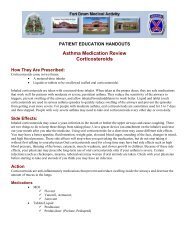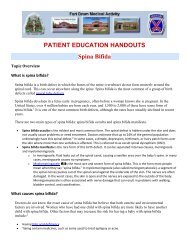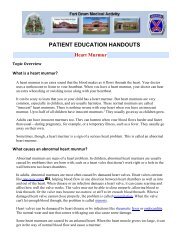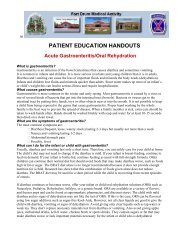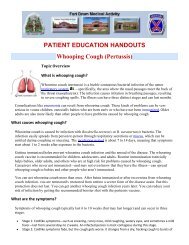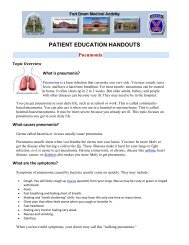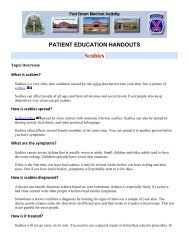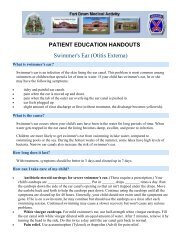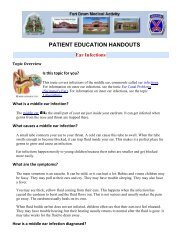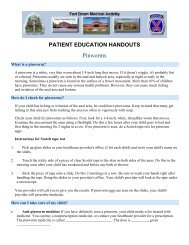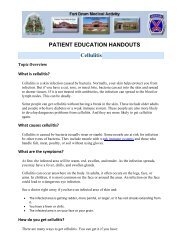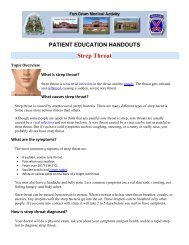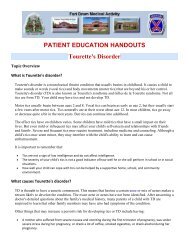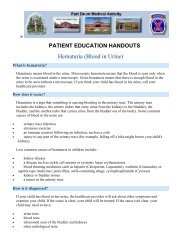PATIENT EDUCATION HANDOUTS Sinusitis
PATIENT EDUCATION HANDOUTS Sinusitis
PATIENT EDUCATION HANDOUTS Sinusitis
Create successful ePaper yourself
Turn your PDF publications into a flip-book with our unique Google optimized e-Paper software.
<strong>PATIENT</strong> <strong>EDUCATION</strong> <strong>HANDOUTS</strong><br />
<strong>Sinusitis</strong><br />
Topic Overview<br />
What is sinusitis<br />
What causes sinusitis<br />
<strong>Sinusitis</strong> can be caused by three things:<br />
• Viruses.<br />
• Bacteria.<br />
• Fungi.<br />
<strong>Sinusitis</strong> is infection or inflammation of the lining of the sinus cavities. These are<br />
hollow spaces in your cheeks and around your eyes. Sinus infections often follow a<br />
cold and cause pain and pressure in your head and face.<br />
<strong>Sinusitis</strong> can be either acute (sudden) or chronic (long-term). With chronic sinusitis,<br />
the infection does not ever go away completely. You always have some symptoms.<br />
The same viruses that cause the common cold cause most cases of sinusitis.<br />
When the lining of the sinus cavities gets inflamed from a viral infection like a cold, it swells. This is viral<br />
sinusitis. The swelling can block the normal drainage of fluid from the sinuses into the nose and throat. If<br />
the fluid cannot drain and builds up over time, bacteria or fungi (plural of fungus) may start to grow in it.<br />
These bacterial or fungal infections can cause more swelling and pain. They are more likely to last longer,<br />
get worse with time, and become chronic.<br />
Nasal allergies or other problems that block the nasal passages and allow fluid to build up in the sinuses<br />
can also lead to sinusitis.<br />
See a picture of normal facial sinuses and a picture of a blocked sinus .<br />
What are the symptoms<br />
The main symptoms of sinusitis are a runny or stuffy nose and pain and pressure in your head and face.<br />
You may also have a yellow or green drainage or drip from your nose or down the back of your throat<br />
(postnasal discharge). Where you feel the pain and tenderness depends on which sinus is affected.<br />
Other common symptoms of sinusitis may include:
• A headache.<br />
• Bad breath.<br />
• A cough that produces mucus.<br />
• A fever.<br />
• Pain in your teeth.<br />
• A reduced sense of taste or smell.<br />
How is sinusitis diagnosed<br />
Your doctor can tell if you have sinusitis by asking questions about your past health and doing a physical<br />
exam. You probably won't need any other tests.<br />
How is it treated<br />
Viral sinus infections usually go away on their own within 10 to 14 days. Antibiotics don't work for viral<br />
infections. But there are some things you can do at home to help relieve your symptoms:<br />
• Drink plenty of fluids.<br />
• Try over‐the‐counter pain relievers and decongestant pills to help relieve the pain and pressure in your head and<br />
face.<br />
• Put a hot, damp towel or gel pack on your face for 5 to 10 minutes at a time, several times a day.<br />
• Breathe warm, moist air from a steamy shower, a hot bath, or a sink filled with hot water.<br />
• Use saltwater nose drops to help keep the nasal passages open and wash out mucus and bacteria.<br />
Home treatments may help drain mucus from the sinuses and prevent a more serious bacterial or fungal<br />
infection.<br />
Bacterial infections can be treated with antibiotics. You will probably feel better in a few days, but some<br />
symptoms may last for several weeks. You may need to take the medicine for a longer time if you have<br />
chronic sinusitis.<br />
If you have a fungal infection—which is not common—antibiotics won't clear up your sinusitis. With this<br />
type of infection, you may need treatment with antifungal medicines, steroid medicines, or surgery.<br />
If you have taken antibiotics and other medicines for a long time but still have sinusitis symptoms, you<br />
may need surgery. You may also need surgery if the infection is likely to spread or if you have other<br />
problems, such as a growth (polyp) blocking the nasal passage.<br />
Frequently Asked Questions<br />
Learning about sinusitis:<br />
Being diagnosed:<br />
• What is sinusitis<br />
• What causes it<br />
• Can I prevent sinusitis<br />
• What are the symptoms<br />
• What happens in sinusitis<br />
• What increases my risk<br />
• Who gets sinusitis<br />
• Who can diagnose sinusitis<br />
• How is it diagnosed
Getting treatment:<br />
• How is it treated<br />
• What medicines will I need to take<br />
• What over–the‐counter medicines can I take<br />
• Should I have surgery for sinusitis<br />
Ongoing concerns:<br />
Living with sinusitis:<br />
• What problems can sinusitis cause<br />
• What can I do at home to relieve symptoms<br />
Author: Amy Fackler, MA<br />
Debby Golonka, MPH<br />
Last Updated: August 22, 2006<br />
Medical Review: Renée M. Crichlow, MD ‐ Family Medicine<br />
Martin Gabica, MD ‐ Family Medicine<br />
Kathleen Romito, MD ‐ Family Medicine<br />
Charles M. Myer, III, MD ‐ Otolaryngology<br />
______________________________________________<br />
Reviewed 9 June 2008



